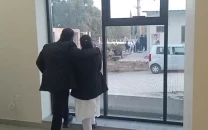Landlocked, deadlocked
Two days of discussions in Islamabad between the economic officials of Afghanistan and Pakistan focused mainly on trade.

In our official brochures to attract foreign investment, Pakistan’s geopolitical location is often described as a major resource endowment, waiting to be exploited. What it implies is the existence of vast economic depth in terms of transit trade in the region. While it is a welcome shift from the elusive strategic depth, the realization of economic depth is constrained by an unchanging mindset. An unchanged transit trade agreement since 1965 and a contentious memorandum of understanding brokered by the United States last year indicate the muddiness of these waters.
Bilateral trade with Afghanistan is extremely profitable. From a mere $200 million some five years ago, exports from Pakistan have gone up more than seven-fold to $1,500 million. Not many would know that Afghanistan is the second largest destination for Pakistani exports. In terms of imports from Afghanistan, the poor and wretched country does not even make it to the first twenty countries.
But imports there are — free trade to the tribes and smuggling to the Pakistan side, and believed to be much larger than the formal trade. These ‘imports’ into Pakistan, not necessarily of Afghan origin, are goods imported by Afghanistan through its transit trade arrangement with Pakistan. As some never make it to Afghanistan and the bulk somehow find their way back to Pakistan, industry in the latter suffers and often officials protest. They then try to control it through a negative list to stop goods that are known to have little use for Afghanistan, and through a one-sided control of the means of transport.
Instead of making trade policy for Afghanistan, Pakistan should learn to mind its own business and to concern itself with controlling smuggling. For far too long our border agencies have blamed it on the porous nature of the border and not taken it as a serious business. For the first time the Afghans are talking about smuggling running into billions of dollars from Pakistan. Again, how can Pakistan keep on maintaining non-reciprocity in trucking and other means of transport?
Pakistan wants transit through Afghanistan to gain access to the Central Asian Republics on its own trucks and by building, in time, rail linkages. It is also eyeing the potential to import energy. She has, however, no desire to do the same for Afghanistan vis-a-vis India. Pakistan has famously not accorded the most-favoured nation treatment (MFN) to India, a basic WTO requirement. As for India, though it has given Pakistan most-favoured nation status, she remains light years away from allowing Pakistan transit trade to Nepal and Bangladesh. The same approach makes the agreed South Asian Free Trade Area a distant possibility.
Until the region’s leaders can break the logjam of peace first, trade later approach, Afghanistan’s rights under the UN Convention on Transit Trade of Landlocked States will continue to face polite resistance. This also means that Pakistan’s own dream of becoming a hub of trade and commerce is not coming true any time soon. Afghanistan is landlocked, Pakistan is deadlocked.
Published in The Express Tribune, July 9th, 2010.



















COMMENTS
Comments are moderated and generally will be posted if they are on-topic and not abusive.
For more information, please see our Comments FAQ